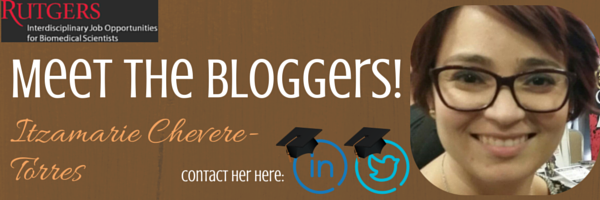
 I was an undergraduate student at the University of Puerto Rico when I had my first research experience in neuroscience. Dr. Sandra Peña de Ortiz saw my potential as a scientist and allowed me to join her research team, characterizing opioid receptors and spatial learning. This was an exciting first research experience that helped motivate me to pursue a graduate degree leading to a career in science. I continued my doctoral studies in Biology, where I conducted behavioral studies of the CREB transcription factor and its role in learning and memory. After the completion of my Ph.D. degree, I left my country and family to seek postdoctoral training that would include a more comprehensive molecular approach for understanding the mechanisms responsible for neural plasticity. Under the supervision of Dr. Eric Klann at New York University, I studied how the dysfunction in molecular signaling that controls protein synthesis is correlated with altered synaptic plasticity and behavior in Tuberous Sclerosis Complex (TSC) disease, a rare genetic disorder. During that time I was awarded with the NRSA Postdoctoral Fellowship, from the National Institute of Mental Health. At the end of my postdoctoral training, I felt that I needed to broaden my expertise and work with a different animal model, if I wanted to better understand the cell biological and molecular basis of neural transmission. This, I thought would give me a complete picture of how the nervous system mediates behavior, and how behavior is altered in disease. For this reason, in September 2011, I joined Dr. Christopher Rongo’s lab at the Waksman Institute of Microbiology, Rutgers University. My research work there was to characterize how regulated AMPA receptor (AMPAR) trafficking is not only modulated by external experience but in turn mediates long-term behavioral changes and plasticity within an intact animal model (C. elegans). My research position was impacted when in October 2013 the United States federal government entered a shutdown, causing the loss of my financial support. Luckily, I was able to find a position at Dr. Gleb Shumyatsky's research lab where I am applying all my neuroscience knowledge and skills in the development of a new and exciting project, examining how changes in microtubule stability in neurons contribute to symptoms of depression and postpartum depression. Because of all the challenging experiences that I have been through while developing my science career, I want to serve as mentor, counselor and teacher to the next generation of students who are considering a career in science. I want to work in science communication, not only within the scientific community, but more importantly, communicating science to the public. If the science discoveries that we make are not shared with the public, they just simply die on the bench. Questions? Contact Itzamarie via LinkedIn or Twitter, or leave them in the comments below!
I was an undergraduate student at the University of Puerto Rico when I had my first research experience in neuroscience. Dr. Sandra Peña de Ortiz saw my potential as a scientist and allowed me to join her research team, characterizing opioid receptors and spatial learning. This was an exciting first research experience that helped motivate me to pursue a graduate degree leading to a career in science. I continued my doctoral studies in Biology, where I conducted behavioral studies of the CREB transcription factor and its role in learning and memory. After the completion of my Ph.D. degree, I left my country and family to seek postdoctoral training that would include a more comprehensive molecular approach for understanding the mechanisms responsible for neural plasticity. Under the supervision of Dr. Eric Klann at New York University, I studied how the dysfunction in molecular signaling that controls protein synthesis is correlated with altered synaptic plasticity and behavior in Tuberous Sclerosis Complex (TSC) disease, a rare genetic disorder. During that time I was awarded with the NRSA Postdoctoral Fellowship, from the National Institute of Mental Health. At the end of my postdoctoral training, I felt that I needed to broaden my expertise and work with a different animal model, if I wanted to better understand the cell biological and molecular basis of neural transmission. This, I thought would give me a complete picture of how the nervous system mediates behavior, and how behavior is altered in disease. For this reason, in September 2011, I joined Dr. Christopher Rongo’s lab at the Waksman Institute of Microbiology, Rutgers University. My research work there was to characterize how regulated AMPA receptor (AMPAR) trafficking is not only modulated by external experience but in turn mediates long-term behavioral changes and plasticity within an intact animal model (C. elegans). My research position was impacted when in October 2013 the United States federal government entered a shutdown, causing the loss of my financial support. Luckily, I was able to find a position at Dr. Gleb Shumyatsky's research lab where I am applying all my neuroscience knowledge and skills in the development of a new and exciting project, examining how changes in microtubule stability in neurons contribute to symptoms of depression and postpartum depression. Because of all the challenging experiences that I have been through while developing my science career, I want to serve as mentor, counselor and teacher to the next generation of students who are considering a career in science. I want to work in science communication, not only within the scientific community, but more importantly, communicating science to the public. If the science discoveries that we make are not shared with the public, they just simply die on the bench. Questions? Contact Itzamarie via LinkedIn or Twitter, or leave them in the comments below!
iJOBS Blog